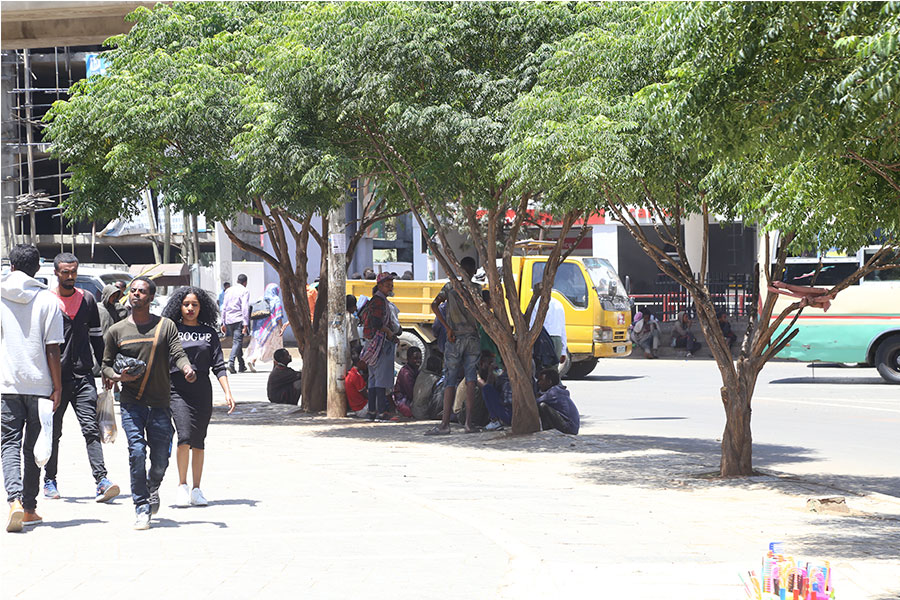
Fortune News | May 02,2020
Apr 12 , 2020
By MUHABA OUMER ( FORTUNE STAFF WRITER )
The Oromia Regional State has kicked off a 600-million-Br project that will provide potable water for 140,655 residents in Bale Robe town and its surroundings.
Launched on March 25, 2020, the project will be jointly funded by the regional government, the federal government, the World Bank and the residents of Bale Robe.
Enterprise Feljas & Masson, a French firm focused on water extraction, pumping and treatment, is engaged in the construction of the project in a joint venture with Bermong Construction Plc, a local grade one construction firm, and SIRAM Trading Plc, a sister company of grade one contractor 3M Engineering Plc.
The project will connect Shoya and Lolla rivers to a plant where the water will be treated.
The water project, which is expected to be completed in a year and a half, will also include drilling four boreholes estimated to pump 4,000 cubic metres of water a day. The project also consists of the construction of two reservoirs that can each hold 2,500 cubic metres of water. It has also created job opportunities for more than 200 people in the town.
The project will provide clean drinking water and sanitation facilities for the next 20 years to the residents of Robe town and the surrounding areas, which are known for having a shortage of water.
Currently, the people in the town fetch water from the Lolla River, according to Abdul Jalil Adulrobe, mayor of Bale Robe.
“Women and girls no longer have to walk long distances and spend many hours to fetch water," the mayor said. "Girls can go to school, while mothers have enough time to spend with their children and engage in other productive activities."
The town administration launched the project to expand the capacity of the town’s existing water supply system, according to Tariku Demeke, head of Bale Robe Town Water Authority Office.
The project involves managing liquid sludge and waste from containment to recycling, improving water and sanitation in institutions such as schools and health facilities, and establishing a business model for managing the facility comprised of the local administration and private operators, according to Tariku.
The project also works with the Ministry of Urban Development and Construction and the respective sector regional bureaus, as well as the town’s administration and water supply & sewerage offices.
Tagegn Alemayehu, an independent consultant in water administration and environmental engineering, mentioned the Robe water supply and waste management project as an exemplary model of successful joint undertakings.
The main objective is to improve access to water and hygiene services, thus improving the health of the communities and saving time and effort for women and girls so they can focus on education, social participation and development activities, according to Tagegn.
The project will improve the biological and physical resources of the area, according to Gemechu Hashim, the construction manager of the project, which will build six toilets and six shower facilities in the town.
The first draft of the project was tabled in 2011 but was approved and commenced nine years later due to delays caused by a controversial bidding process and a shortage of budget, according to Tariku.
In the context of a changing urban environment due to population growth, alternative water sources must be explored to create water security, according to Sisay Tariku, a water engineering expert and lecturer at Jimma University.
However, water infrastructure projects should consider climate change, population growth and other socioeconomic factors, Sisay noted.
"Public infrastructure, including water projects and sewage services, are essential to the efficient functioning of urban areas," he said. "Infrastructure provides the resources necessary to support the urban economic environment."
PUBLISHED ON
Apr 12,2020 [ VOL
21 , NO
1041]

Fortune News | May 02,2020

Radar | Aug 03,2019

Radar | Jul 24,2021

Agenda | Mar 23,2019

Radar | Nov 21,2018

Dec 22 , 2024 . By TIZITA SHEWAFERAW
Charged with transforming colossal state-owned enterprises into modern and competitiv...

Aug 18 , 2024 . By AKSAH ITALO
Although predictable Yonas Zerihun's job in the ride-hailing service is not immune to...

Jul 28 , 2024 . By TIZITA SHEWAFERAW
Unhabitual, perhaps too many, Samuel Gebreyohannes, 38, used to occasionally enjoy a couple of beers at breakfast. However, he recently swit...

Jul 13 , 2024 . By AKSAH ITALO
Investors who rely on tractors, trucks, and field vehicles for commuting, transporting commodities, and f...

Oct 18 , 2025
The political establishment, notably the ruling party and its top brass, has become p...

Oct 11 , 2025
Ladislas Farago, a roving Associated Press (AP) correspondent, arrived in Ethiopia in...

Oct 4 , 2025
Eyob Tekalegn (PhD) had been in the Governor's chair for only weeks when, on Septembe...

Sep 27 , 2025
Four years into an experiment with “shock therapy” in education, the national moo...